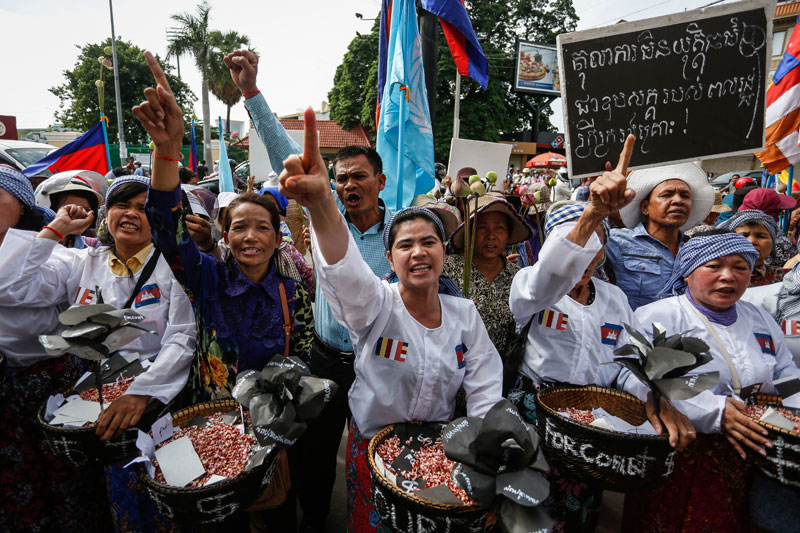Human Rights Watch (HRW) says the World Bank is not doing enough to help people in Cambodia and elsewhere who are facing government harassment for speaking out against Bank-funded projects gone bad.
In a report released Monday, “At Your Own Risk: Reprisals against critics of World Bank Group projects,” HRW uses the mass eviction of Phnom Penh’s Boeng Kak neighborhood as a prime example of the failings of the Bank and its private lending arm, the International Finance Corporation (IFC).

The World Bank has conceded that mistakes it made designing and monitoring a now-defunct land titling project it was funding in Cambodia contributed to the forced eviction of some 3,000 families from Boeng Kak to make way for a CPP senator’s real estate project. Since 2008, residents who have protested against the project have been beaten by police at peaceful protests, detained, and repeatedly convicted and jailed on charges that have been rebuked as politically motivated.
“The World Bank has long said that public participation and accountability are key to the success of the development efforts it funds,” Jessica Evans, HRW’s senior international financial institutions advocate, said in a statement. “But the World Bank’s repeated failure to confront intimidation or harassment of people who criticize its projects risks making a mockery out of these principles.”
According to the report, the Bank’s inspection panel even found cases in some countries where the Bank’s own staff discouraged people from filing complaints against their projects. In Cambodia, Boeng Kak residents said the Bank urged them not to take their complaints of harassment to local NGOs “because criticizing the World Bank and government was ‘their job.’”
In 2002, HRW says, the World Bank spoke out against the Cambodian government’s crackdown on a protest, calling it “unacceptable” and accusing officials of hypocrisy. “Despite similarly brutal crackdowns in recent years,” HRW says, “the World Bank has remained silent.”
In its report, HRW offers the Bank several recommendations, including publicly denouncing any instance of government or corporate reprisal against project critics and urging the unconditional release of those detained on trumped-up charges.
It also recommends more pre-emptive steps, such as taking more care to assess the possibility of future reprisals before committing to a project, and getting the Bank’s corporate and government partners to guarantee that critics will not be harassed.
In Boeng Kak, few residents have been harassed as much as Tep Vanny. Often at the forefront of the protests against the neighborhood’s evictions, she has been repeatedly assaulted by security forces, detained, charged and jailed.
She agreed with HRW that the Bank has done too little to help her and her fellow protesters.
“We wanted to see the World Bank intervene to talk with the government when our people were put in jail, but we have never even seen them come to visit us,” Ms. Vanny said. “They have ignored us.”
In an emailed response to questions on the report, World Bank spokesman Bou Saroeun wrote that the Bank had “strong policies and mechanisms that address many concerns raised by human rights advocacy groups and civil society, and we are open to dialogue on improvements.”
“Fair and peaceful resolution of land conflict is critical to Cambodia’s sustained economic and social development,” he added. “We continue to discuss with the government on how to support the country’s development in a way that benefits all Cambodians.”
Before releasing the report, HRW also approached the World Bank for feedback on its allegations. According to the report, World Bank country manager Alassane Sow denied claims from protesters that he offered to raise their complaints with the U.N. and said he repeatedly encouraged them to “reach out” to local authorities about the land titles they were demanding.
The report adds that Mr. Sow said the reprisals against the Boeng Kak protesters were “not relevant.”
Mr. Saroeun did not address questions about these specific claims in his response.
According to the report, the Bank is developing guidelines on how to respond to reports of reprisals, and the IFC’s ombudsman has promised to consider HRW’s recommendations.
Though the Bank has not taken any obvious steps in reaction to the Cambodian government’s reprisals against Boeng Kak protesters, it did freeze new lending to the country in 2011 in objection to the neighborhood’s forced evictions.
The government reacted to the move by issuing land titles to the roughly 700 families who had yet to leave the neighborhood, letting them keep their homes. But it also downplayed the impact of the freeze, insisting that other international donors would happily fill in the funding gap.
Given China’s rise as a key donor and investor in Cambodia, observers say the government has a point.
But Phil Robertson, HRW’s deputy Asia director, said the government was still keen to keep the World Bank around, if only for the confidence its presence gives foreign investors.
“The Cambodian government knows that any departure of the World Bank from Cambodia would be a major blow to the confidence of investors thinking about directly investing in the country. Money is the ultimate king in Cambodia, and continuing investment inflows is a key part of ensuring that money keeps on coming in,” he said by email.
“The World Bank should be able to use that reality as sufficient leverage to get protesters released from custody and demand other civil society activists not be targeted.”
The pending arrival of China’s Asian Infrastructure Investment Bank as a rival to lenders like the World Bank has made fears of their being sidelined in the region more acute. But Mr. Robertson said the Investment Bank, which has yet to declare its rights safeguard policies, still lacked the clout and credibility foreign investors want.
(Additional reporting by Aun Pheap)



